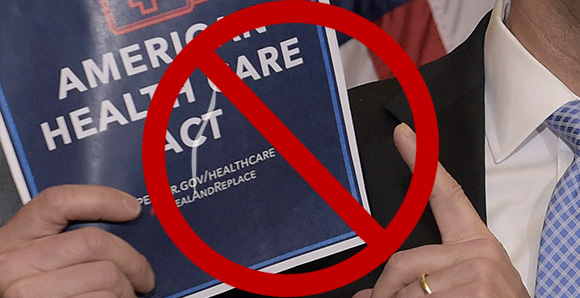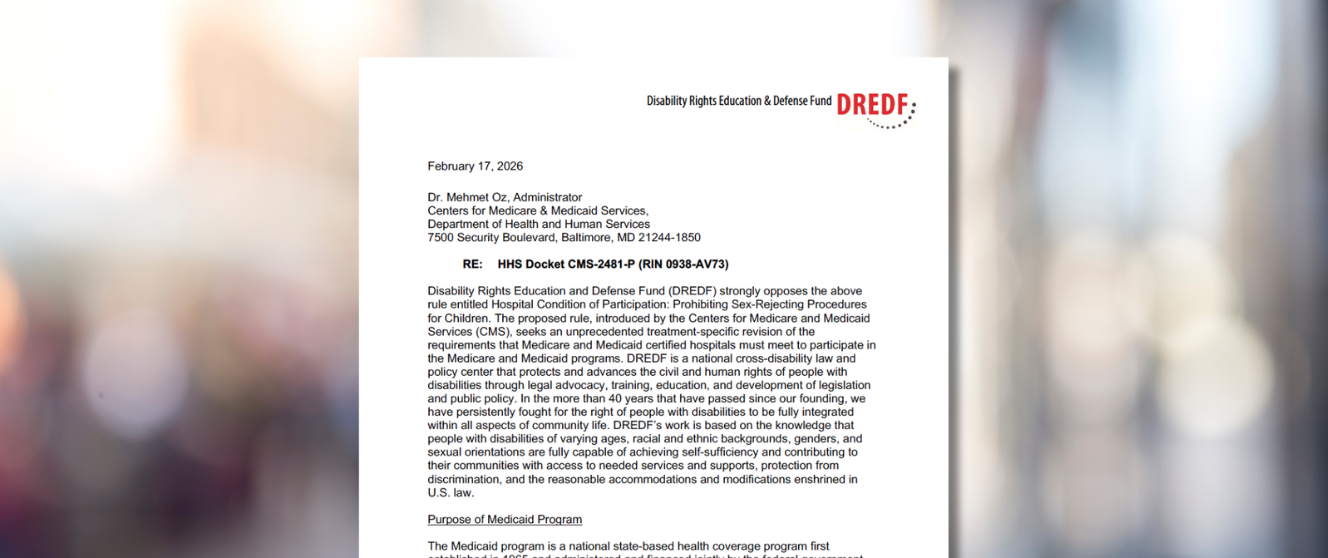
This page is being preserved for historical record and future reference, even though it may no longer be actively used or up to date.

The latest amended attempt to revive the American Health Care Act (AHCA), the Republican bill to repeal and replace the Affordable Care Act (ACA), is worse than the original bill. It will allow states to cut off people with disabilities from the general exchange pool and eliminate consumer protections such as bans on lifetime limits or benefit caps for such vital benefits as prescription drugs, mental health treatment and maternity benefits. Plus the bill still retains drastic cuts to Medicaid of $880 billion over 10 years and takes away cost protections for older and low income Americans over 55.
Even without the latest changes, the AHCA affects millions of low–income people with disabilities and seniors by threatening the “optional” community–based long–term services and supports that Medicaid alone provides.
Add your voice to ours. Take Action Today, May 2!
Join the National Day of Action to protect Medicaid and healthcare for millions of Americans.
Call, Fax, Tweet, Email or Post on Facebook
Telephone calls: Use the Congressional switchboard at 202 – 224 – 3121 and ask to speak to your Representative—tell them where you live and you will be directed to your Member of Congress
By Fax: Use Faxzero.com to find your Representative’s fax number
Social Media: Use contactingcongress.org to find email addresses, Twitter names, an Facebook pages for your Representative.
Sample Script: My name is ________________, and I’m calling to tell you that I oppose, and expect you to oppose the American Health Care Act. We’re not going back to a pre – ACA era where insurers could ignore the needs of people with disabilities and pre – existing conditions and everyone was one medical emergency away from bankruptcy. If you value the health and well – being of your constituents you must speak and vote against the AHCA.
The Latest Version of the AHCA is an Empty Promise to America
The new amendment makes the empty promise that there will be no limits on coverage for people with pre – existing conditions, but the detailed print makes it absolutely clear that:
- States will have the right to let insurers charge much higher premiums to people with disabilities, just as they did before the ACA
- States will have the ability to reconfigure “essential health benefits” and potentially completely exclude critical coverage items such as rehabilitation and habilitation services and devices and mental health treatment, or allow insurers to bypass current federal regulations that help ensure a robust prescription drug benefit
- Millions of people with pre – existing conditions ranging from asthma to cancer, from depression to a slipped disc, can be segregated into high risk insurance pools that have always, in practice, wound up providing very expensive insurance products that offer inadequate coverage and are hard to get
- Important consumer cost protections such as annual and lifetime benefit caps, as well as out – of – pocket cost caps, can be eliminated even for those with employment health coverage because these protections are tied to the definition of essential health benefits that could be totally controlled by individual states
- The AHCA financially penalizes people who have interruptions in their health coverage, and that directly penalizes lower income people with disabilities who must juggle multiple out – of – pocket health care costs but who cannot go longer – term without essential coverage
Simultaneous Attacks
The latest AHCA amendments have not occurred in a vacuum.People with disabilities face the threat of drastic cuts to federal funding of Medicaid, state plans to change the very nature of the Medicaid program, budget decisions that will shorten long – term funding for Medicare, proposed laws that will force disclosure of an employee’s disability or their spouse’s disability, and unjustified restrictions on Social Security disability eligibility, as well as direct attacks on the Americans with Disabilities Act, the foundational law that recognizes the civil rights of the disability community.We have a Secretary of Education that has already exhibited her ignorance in the area of special education. And many people with disabilities are directly affected by executive actions that harm immigrants and their families, and regulatory decisions and cases that harm LGBTQ individuals. Over the past decades, we have fought to establish that we cannot be defined solely by our medical diagnosis. But healthcare, and the lack of it, strikes at the heart of our ability to fully engage with and in the world.
Insurance Segregation Leads to Actual Segregation for People with Disabilities
Private health insurance has excluded people with disabilities for its entire history. We have been consigned to underfunded and unaffordable high risk pools that failed to offer adequate coverage. We have been told we can’t earn an income or save to get needed services through Medicaid.Employment wellness programs threaten our ability to maintain employment insurance for the minority of us who are fortunate enough to have good employment coverage.The U.S. Supreme Court in the Olmstead decision found that people with disabilities should not have to remain segregated in institutions just to get the services that we need to survive.But the key to community integration will be lost if our laws allow wholly unaffordable healthcare within our communities, inadequate coverage, thousands in penalties for not disclosing our disabilities, and deep cuts to state Medicaid funds that will put home and community – based services on the chopping block.
In essence, the AHCA tells people with disabilities that they can’t be kept out of the cafeteria, but they can be charged much more and only get junk to eat.
Please! Join the National Day of Action Today, May 2
and tell your representatives to vote NO on the AHCA.

